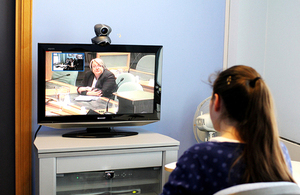First victims spared harrowing court room under pre-recorded evidence pilot
The first ever case allowing vulnerable victims and witnesses to give evidence ahead of the trial will start tomorrow.

Pre-trial cross examination
In a ground-breaking pilot, the most vulnerable victims and witnesses are now able to give their evidence and be cross-examined away from the intense atmosphere of a live courtroom, in an attempt to spare them from what could be aggressive questioning in front of jury, judge and their alleged attacker. This Government is initially trying this new approach in three courts with the aim of rolling it out more widely if successful.
People who may find it difficult to give their best possible evidence in a courtroom environment and all child victims will be considered for pre-trial cross-examination in the pilot areas. This allows them to give their evidence and be cross-examined by both prosecution and defence barristers ahead of the trial, in front of a judge, and then it is shown to the jury as part of the trial. Previously victims could have been subject to lengthy, stressful questioning by multiple barristers in view of jurors and the public gallery.
The start of this trial marks the latest in a series of measures aimed at making the criminal justice system better meet victims’ needs, in particular the recent overhaul of the Victims’ Code, as well as the provision of more money than ever before to help and support victims as they cope and recover from the traumatic effects of crime.
Following a visit to Kingston-upon-Thames Crown Court to see how pre-trial cross-examination would work in practice, Victims’ Minister Damian Green said:
It is crucial that people who have experienced or reported horrific crimes are given the highest possible level of protection and support. I am determined that their needs will be put first.
It is vital the right to a fair trial is upheld. As part of that if someone is accused of a crime they should be brought to justice as swiftly as possible. If you have experienced a horrendous crime, giving evidence in the pressured environment of a live courtroom, in front of the jury and the public gallery, can be intimidating and perhaps too much to ask.
That’s why we are trying a new approach, the first of its kind, which prioritises the victim. I hope this test will allow pre-trial cross-examination to take place more widely.
Three Crown courts - Leeds, Liverpool and Kingston-upon-Thames – are testing pre-trial cross-examination this year. The Victims’ Minister visited Kingston late last week to see how it will work in practice and spoke with advocates and the judiciary about the improved court room experience it will offer the most vulnerable. Prior to this, victims and witnesses could only be cross-examined in court during the trial, although provisions existed to support those deemed vulnerable, such as giving evidence from behind a screen or via a video link.
As well as allowing the most vulnerable and traumatised to avoid attending the trial, it will give them the opportunity for counselling and other therapy to commence far earlier and without the impact of having to re-live their experience all over again, whilst still ensuring a fair trial.
There will be now a six-month period in which pre-trial cross-examination is tested in action.
Adam Pemberton, Assistant Chief Executive at Victim Support, said:
We welcome these pilots because repeated, aggressive, questioning of vulnerable witnesses in a packed courtroom cannot be the best way to obtain sound and accurate evidence. More importantly, it is not the right way to protect vulnerable victims and witnesses from what can often be a distressing and traumatic experience.
Victims and witnesses are entitled to a fair trial as well as defendants and we believe pre-recorded evidence taken in a less intense environment and when events are fresher in the mind will help level the playing field. However, it remains critical that vulnerable and intimidated witnesses get specialist help and support throughout the criminal justice process too.
Notes to editors
All witnesses under 16 years old and those with a mental or physical disorder which is likely to result in their evidence being diminished will be eligible to give evidence in this way in participating courts. If successful we will look at including vulnerable victims of the most serious crimes like rape and sexual violence as part of any roll out.
The Ministry of Justice has been working with the judiciary, Her Majesty’s Courts and Tribunal Service, the Association of Chief Police Officers and the Crown Prosecution Service, to establish pre-trial cross examination under Section 28 of the Youth Justice and Criminal Evidence Act 1999.
The 10 month pre-trial cross-examination pilot is taking place in Leeds, Liverpool and Kingston-Upon-Thames Crown courts, with the intention of rolling it out more widely if it proves a success. Since December the police and CPS have been identifying suitable victims to take part in the trial in these three areas and the filming of evidence starting this week.
There are many provisions already in place to help young and vulnerable victims and witnesses give evidence in court including special measures – such as giving evidence from behind a screen or by video link, and access to a registered intermediary.
From next year even more money will be available for services to support victims of crime, with a potential total budget of up to £100 million, double the Ministry of Justice’s current spending.